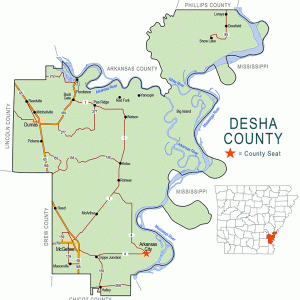calsfoundation@cals.org
Kelso (Desha County)
Kelso (Desha County) is a historic community fourteen miles northeast of McGehee (Desha County). The community began with the local development of the railroad in the early twentieth century and is known as the site of an experimental agricultural station.
The area that would become Kelso was the site of a minor Civil War skirmish that occurred on February 19–20, 1863. The skirmish began at Cypress Bend (Desha County) on the Mississippi River ten miles due east of the area of Kelso. Even today, residents remark of a cannonball embedded in a walnut tree near the Kelso Cemetery. During the war, many people living at Cypress Bend moved to the area of Kelso to escape cannon fire from Union gunboats firing at a small but persistent Confederate battery at Cypress Bend.
In September 1904, the St. Louis, Iron Mountain and Southern Railroad (later part of the Union Pacific) completed a rail line over the Arkansas River from Helena (Phillips County). Kelso Depot was named for George Kelso, a popular engineer surveying the railroad bed. The opening of the railroad created the prosperous timber industry. A small school and two large sawmills operated in Kelso, as well as businesses to support the sawmills and the numerous families farming nearby. It was incorporated in February 1913 but never functioned as a municipality. At its peak in 1920, the population of the town was 231. The Flood of 1927 devastated Kelso and all of Desha County. The declining forests discouraged the sawmill owners from rebuilding following the flood, and the industry ceased.
Kelso is perhaps best known as the physical location of the Southeast Research and Extension Center–Rohwer Division, previously called the Arkansas Agricultural Experiment Station–Rohwer Research Station. The station was established in 1957 with the purchase of 500 acres of prime farmland and the gift of another 134 acres from Baxter Land Company, a prominent business at Kelso. The station later entered into a long-term land lease agreement for an additional 200 acres with the U.S. Department of Agriculture and the U.S. Department of Interior to broaden its scope. In 1993, the station merged with the Southeast Research and Extension Center at the University of Arkansas at Monticello (UAM) campus.
Research at the station has benefited farming practices in southeastern Arkansas by developing specific information to aid farm management decisions based on factors such as variety selection, soil type, fertilizer recommendation, irrigation timing, seeding, and pesticide rates. Many publications distributed by the University of Arkansas Cooperative Extension Service and used by farmers were developed in part by research done at the station located at Kelso.
When the railroad ceased operation in 1969, only a few people still lived in the area. The Arkansas Department of Parks and Tourism is converting the old roadbed into the rails-to-trails Delta Heritage Trail from Helena-West Helena, through the rustic White River National Wildlife Refuge, over the Arkansas River, and through Kelso. It is hoped that a tourist trade can develop along the route.
In the twenty-first century, no businesses operate at Kelso, and children are bussed to school at McGehee. The Kelso Post Office closed in 1975, and postal service is now provided by the post office in Watson (Desha County) seven miles to the north. Farming remains the primary industry. However, a large Potlatch Paper Mill is located at Cypress Bend near Arkansas City (Desha County), employing some residents.
For additional information:
Biographical and Historical Memoirs of Southeast Arkansas. Chicago: Goodspeed Publishing Company, 1890.
Earnest, Larry. “Southeast Research and Extension Center–Rohwer Division, 1958–2008” Brochure produced by the Southeast Research and Extension Center–Rohwer Division.
Images from the Past: A Pictorial History of Desha County, Arkansas and Southeast Arkansas Delta. Marceline, MO: Heritage House, 1992.
Programs of the Desha County Historical Society. McGehee: Desha County Historical Society (1974–).
Helen Pennington
Pine Bluff, Arkansas
 Desha County Map
Desha County Map 




Comments
No comments on this entry yet.